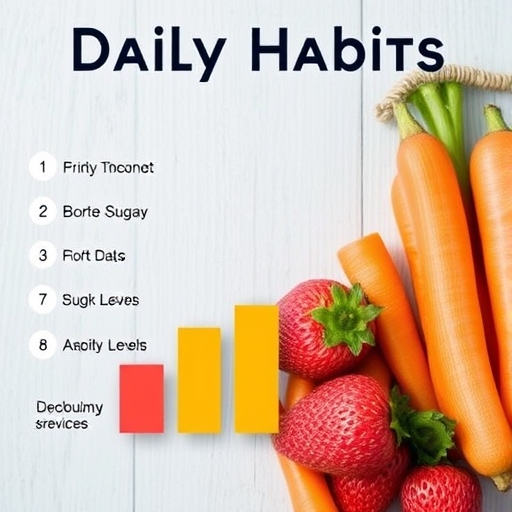Managing blood sugar levels isn’t just about the food you eat—it’s also about your daily habits and lifestyle choices. Consistency in certain practices can make a big difference in keeping glucose levels stable, boosting energy, and supporting overall health.
Here are some daily habits you can adopt to maintain steady blood sugar levels:
1. Start Your Day with a Balanced Breakfast
- Why It Matters: Eating a protein-rich, low-carb breakfast can prevent mid-morning sugar crashes.
- What to Do: Opt for meals like scrambled eggs with spinach and avocado, Greek yogurt with berries, or a smoothie with protein powder and almond milk.
2. Stay Hydrated Throughout the Day
- Why It Matters: Dehydration can lead to higher blood sugar levels, as it reduces the efficiency of glucose metabolism.
- What to Do: Aim for at least 8 glasses of water daily. Add a slice of lemon or cucumber for flavor if plain water feels boring.
3. Eat Regularly
- Why It Matters: Skipping meals can cause blood sugar dips and spikes, leading to fatigue and irritability.
- What to Do: Eat small, balanced meals every 3–4 hours, including snacks if needed. Include a mix of protein, healthy fats, and fiber at each meal.
4. Move Your Body Daily
- Why It Matters: Physical activity helps lower blood sugar by increasing insulin sensitivity and encouraging glucose uptake by muscles.
- What to Do: Incorporate at least 30 minutes of moderate exercise daily, such as brisk walking, cycling, or yoga. Even short walks after meals can make a difference.
5. Prioritize Sleep
- Why It Matters: Poor sleep can lead to insulin resistance and higher blood sugar levels.
- What to Do: Aim for 7–8 hours of quality sleep each night. Maintain a consistent bedtime routine, limit screen time before bed, and create a comfortable sleep environment.
6. Monitor Your Blood Sugar Levels
- Why It Matters: Tracking your levels helps you identify patterns and understand how your body reacts to different foods and activities.
- What to Do: Use a blood sugar monitor or continuous glucose monitor (CGM) to check your levels regularly. Keep a journal to note fluctuations and possible triggers.
7. Manage Stress Levels
- Why It Matters: Chronic stress can lead to elevated cortisol levels, which negatively affect blood sugar regulation.
- What to Do: Practice relaxation techniques like meditation, deep breathing, or mindfulness exercises. Engage in hobbies or activities that help you unwind.
8. Avoid Sugary Beverages
- Why It Matters: Drinks like soda and sweetened coffee can cause rapid spikes in blood sugar.
- What to Do: Stick to water, herbal teas, or black coffee. If you crave sweetness, use a natural low-glycemic sweetener like stevia or monk fruit.
9. Add More Fiber to Your Diet
- Why It Matters: Fiber slows the absorption of sugar into the bloodstream, helping to prevent spikes.
- What to Do: Incorporate fiber-rich foods like vegetables, legumes, nuts, seeds, and whole grains into your meals.
10. Plan Ahead
- Why It Matters: Being unprepared can lead to unhealthy food choices, which can disrupt blood sugar levels.
- What to Do: Meal prep for the week, carry healthy snacks, and plan your meals in advance to avoid relying on fast food or processed options.
Small Changes, Big Results
Maintaining stable blood sugar levels is all about consistency. By building these habits into your daily routine, you’ll feel more energized, reduce your risk of complications, and improve your overall well-being.
What are your go-to habits for managing blood sugar? Share your tips in the comments below!





